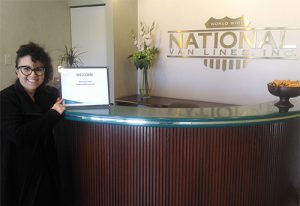
Maureen Beal. I heard this name for the first time at an award ceremony in New Orleans, LA in 2016. She was a recipient of the Lifetime Achievement for Distinguished Service award – the highest honor bestowed by the American Moving and Storage Association.

The warmest welcome of all! Thank you, National Van Lines.
During the ceremony, they played a short video where some industry experts and people close to Maureen talked about her triumphs, character and demeanor and when it finished, I was even more intrigued to see who that wonder woman in question was. I had heard about National Van Lines on other occasions before that event, but it was at that night when I saw the soul of the company.
Maureen stepped up on stage to receive her award and gave a very touching speech. That woman sounded so solid and confident in her statements, and then you could sense a lot of grace and humility from her. In a time when my generation changes jobs more often than ever, that woman decided to dedicate her whole career to such a distressed and difficult industry as moving.
Sadly, I didn’t have the chance to speak with Maureen and learn more about her and her business for the rest of that night, but two years later our paths crossed again, in a way. Due to a family emergency, I couldn’t meet her personally and I only had the opportunity to meet with the CEO, Tim Helenthal whom I was actually going to interview.
I stood still in front of the National Van Lines headquarters, located in Broadview, IL for a few minutes. The thoughts in my head were vigorously galloping and my blood was gleefully dancing through my veins in the rhythm of Beethoven’s 9th Symphony. Ode to Joy. This is it! I finally reached the core of it. I can smell a great story behind those walls.

Tim Helenthal is the current President & COO at National Van Lines. He will officially become the CEO of the company in 2019.
Hello Tim and thank you for having me here at your office. To begin with, can you tell us a bit about the history of National Van Lines?
National Van Lines was started in 1929, but its roots go back to 1901 when F.J. McKee started delivering ice and coal here in Chicago as McKee’s Express. Due to his success in the community, McKee managed to branch out to provide additional services and ultimately he began moving vaudeville sets for acting troupes, including the world-famous Charlie Chaplin.
Later on, he had some health issues and moved to New Mexico for a few years – back then, when you had tuberculosis, you were advised to go to a warm and dry climate. After his recovery, he came back to Chicago and started National Van Lines. A few years later, he decided to bring his son, F.L. McKee into the business. F.L. had moved to California and had made a name for himself in Hollywood. Known as the “Romantic Irish Tenor” he was performing with famous legends like Bing Crosby and Shirley Temple. But he put his dreams on hold and returned to the family business. F.L. McKee stayed at the company until he was almost 90 years old, and when he stepped down, he named his daughter, Maureen, to succeed him.
Maureen had some big shoes to fill. Under F.L’s leadership, National Van Lines became one of the first companies to get interstate household goods moving authority in all 48 states. Back then, every state had their own rules and regulations and it was very difficult for the federal government to regulate movement between states. Holding 48-state moving authority in the US was such a big deal that the bank even considered it one of the company’s assets.
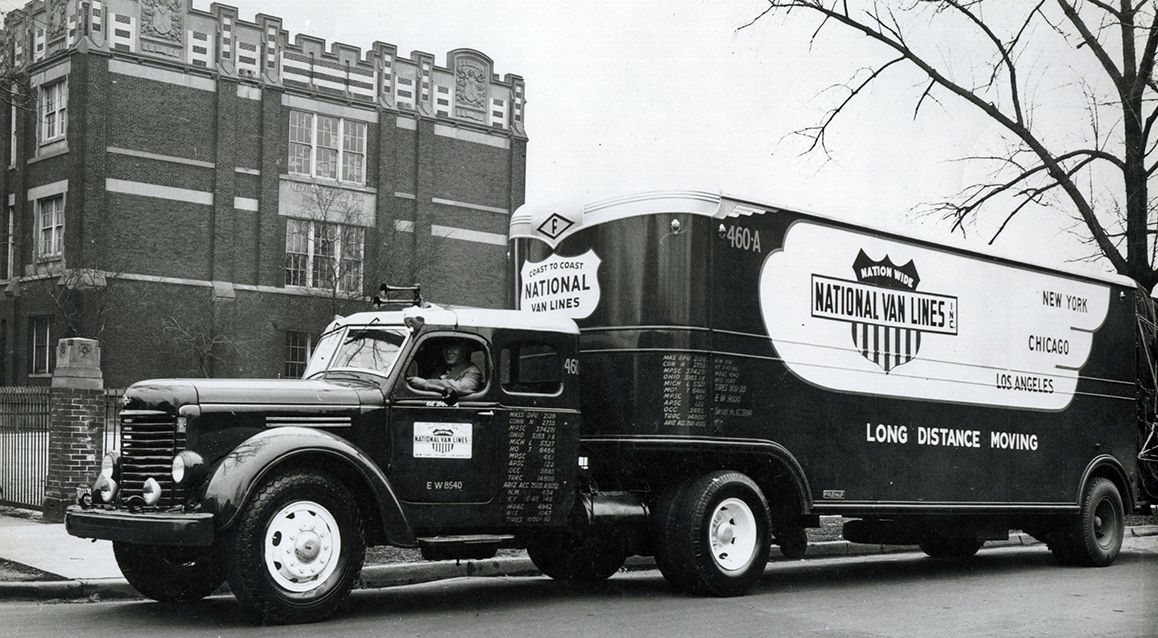
National Van Lines on a moving job years ago.
National also had a tremendous input in the creation and implementation of the uniform household goods bill of lading. Along with a group from the National Furniture Warehousemen’s Association, back in the 40s, F.L. McKee is credited as the author of this significant milestone.
Having been in business for 90 years, we have seen a number of our competitors face challenges. If you look at the bridge that runs across the end of our property, you can see the church that was built on the old Allied Van Lines lot. And if you go down the street over here – about a mile away, you will find the former Bekins Van Lines property. Both companies have been purchased, restructured and reorganized years ago. Many Allied and Bekins employees have found a home here and are still working for National.
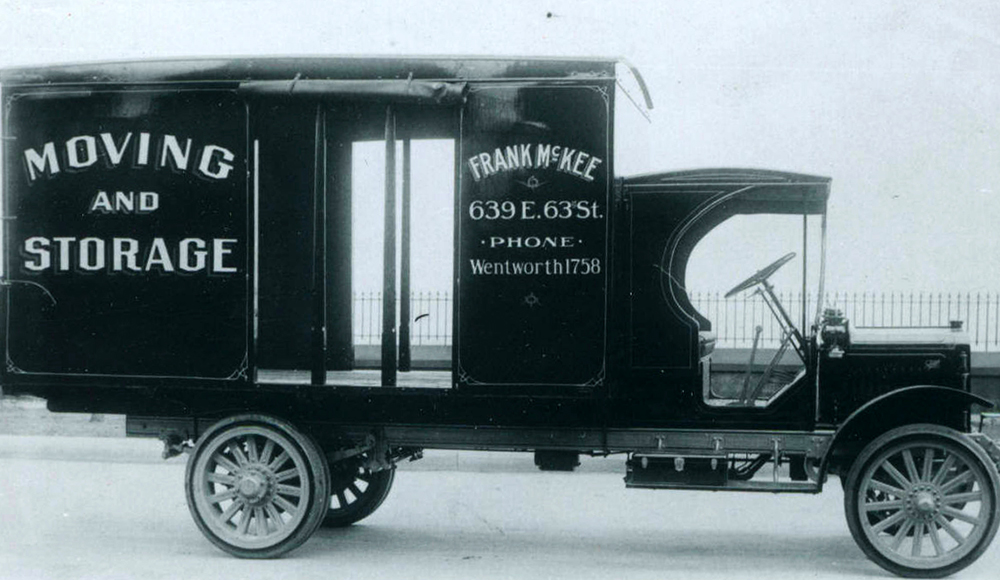
This is how trucks looked like back in 1917.
If you look at the history of the van lines, in 1955 there were approximately 40 ‘traditional” van lines. 50 years later, when we celebrated our 75th anniversary, only 15 of those were still active. Despite our being small, we survived and have been able to overcome struggles which a lot of larger companies didn’t. And it is not a glamorous business – it is a very difficult one.
Another big landmark for National Van Lines came when Maureen began thinking of her own retirement plan. She didn’t have any family who was interested in taking over business and, with a lot of research and deliberation, coupled with true McKee generosity, she and her brother, Ron, decided to turn us into an Employee-owned company.
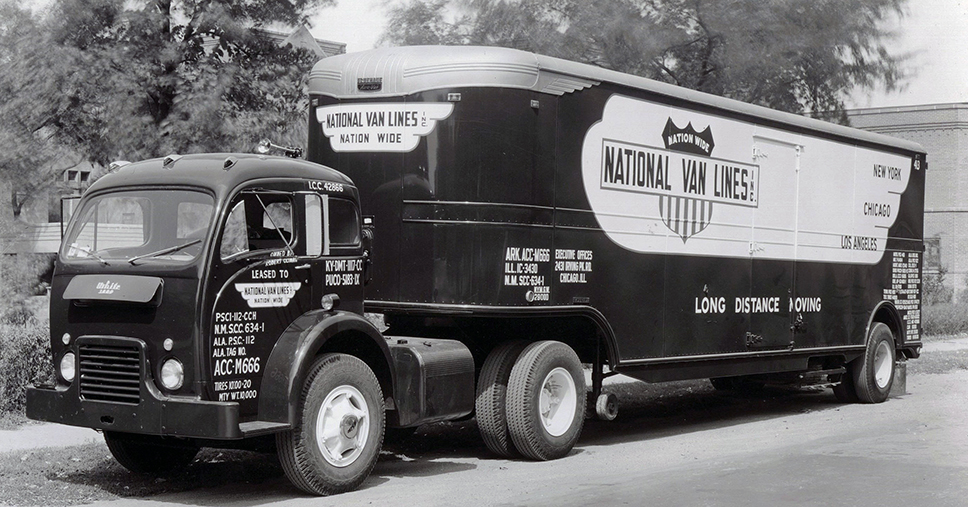
New York, Los Angeles, Chicago, you name it! National Van Lines can do the job!
Maureen had been approached by other companies to potentially buy us out, but she rejected those offers. She knew that if she sold to a larger company, things could change drastically. It happens all the time – businesses come in and take all the good pieces of a company and then lay off employees. Maureen wanted to protect the people who helped build the company into what it is today and so National Van Lines became a 100 percent employee-owned business in 2011. If you are an employee here, once you are vested, you are awarded shares each year, based on your earnings. Employee-owners don’t get the right to vote over business decisions, such as having casual day every day. Those decisions are still made by the management team. We are still in shirt and tie, because that is what Maureen wants – for us to be professional. Employee ownership means you are earning shares and building your own retirement account.
Because this plan is in place, as president and COO, I don’t make decisions based on what is going to happen in the next quarter, or in the next 6 or 12 months. I am not trying to maximize value of the company today, so that I can sell it tomorrow. I and my team can focus on the long term. We can watch the young folks who are starting to work here, stay here, and come into positions of leadership. They are the ones who will benefit from the value of the company. This mindset gives us a different perspective when we decide what our strategies are. It is not short term, it is long-term.
When Maureen did the plan for her succession in 2013, she asked me to take over as CEO in 2019. I was Vice President of Agency Services for National Van Lines’ sister company – National Forwarding Co., which handles all the military business. I am a very fortunate person who works in a company that shares the same value system – be honest and treat others ethically and responsibly.
90 years in business – what’s the recipe to leading a successful and sustainable company?
I think it is 100 percent the way we treat people. It is how we treat our employees, agents and drivers. It is how we treat our customers.
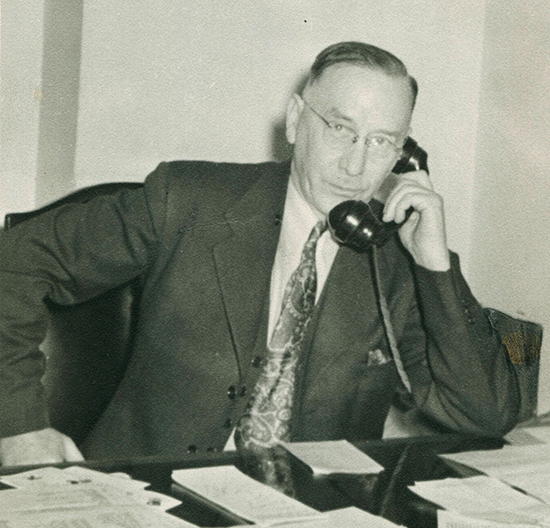
F. J. McKee started National Van Lines in 1929.
In our industry, if an agent sent the van line a bill, charging too much, most companies would say, “Oh, you charged me too much.” The majority of van lines would probably cut the bill and pay the agent the lower amount. We are one of the few companies that if someone sends us a bill and hasn’t charged us enough, we would pay them the right amount. That kind of honesty started with Maureen and Pat Johnson on the military side of the business, where I worked for 18 years. That culture of honesty and integrity is really what carries forward into everything we do. We always try to treat people with the respect they deserve.
You said that you would rather focus on long-term goals rather than short term. What are some of the long-term goals that you currently have?
One of the things that Maureen has always liked to say is that she didn’t want to be the biggest; she wanted to be the best. I love to think that we are going to be the biggest, because we are the best.
Our long term goals are really focused around delivering more value to our customers and building a system that does more than our competitors do. We are unique in our marketplace, because our van line does a little bit more than some others.
A lot of van lines are agent-owned. Their goal is to maximize value back to their agents. Agents operate almost as if the van line is a nonprofit, because they want all the revenue to go back to each of the individual agents. That kind of thinking limits the van line’s ability to grow the brand across the United States. Everyone is worried about what is happening in their backyard. For example, if an agent that is one of the owners of the van line is here in Chicago, they don’t see the opportunities as belonging to the network. They look at them as their opportunities. They peel off, focused on their own business and that doesn’t help grow the brand. When the economy falters or things go goofy, that van line doesn’t have the foundation to be sustainable in the long term, because it is all about the agents and not the network.
I think our focus on the network and its future is how we gain a leg up in the long term – because we can build the van line and develop different programs to help out each of our agents and customers.
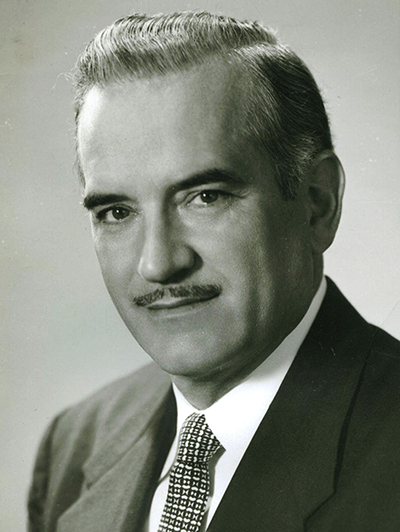
Under F. L. McKee’s leadership, National Van Lines became one of the first companies to get household goods moving authority in all 48 states
Can you give some examples of those programs you have developed for your agents?
It is all about flexibility with our agents. We don’t have a one-size-fits-all program. We don’t come to you and say “Here is our agency contract. This is the only one we have.” We would rather say “Well let’s learn about your business. What do you need? How can we help you become a better sales organization?” At the end of the day, whatever else the agent is, or think they are, they are a sales organization. And so, we try to put together the right programs to help them become better sales people. That means having people go out with their actual sales staff on jobs and estimates. We work with them to put together the best sales techniques to help them with their customer relationship management.
Some other van lines cannot take that approach because they don’t have the capacity or the flexibility to do it. I hate it when I call a company and they say “Sorry we don’t do that” or “No” right off the bat. If a customer wants us to pick up their items tomorrow and deliver them a thousand miles away the next day, I might have to admit we probably couldn’t do it. However, let’s think about it. Maybe it is going to require some extra money, and we might have to do some crazy thing, but I wouldn’t say, “No.” I believe in looking at each situation differently. The world is grey; it is not black and white.
We train our employees to be flexible. When somebody starts working for us, for example, in billing or accounting, I would say “You know, I need you to be flexible.” There may come a day when I need you to be the janitor for the day and I do not want to hear, “It is not my job,” because I would be a janitor for the day. I have no problem doing any job that we have here. I have never asked these people to be the janitor for the day, but I want people to have that mindset of going the extra mile.
I think it is important for us to be flexible in both those ways – employees and customers, and then be honest. Like any relationship, you need to be honest with each other and if you are not, it destroys your relationship. If you withhold information or how you feel, it becomes a grudge and that inevitably results in somebody having a breaking point that spills out.
It may be uncomfortable dealing with a disagreement or a conflict in the beginning, but with time you get better at resolving it. I am also a work in progress, just like everybody else. Our V.P. of IT calls it courageous communication. And we embrace it.
And regarding customers, how do you ensure quality work during each step of the move process?
I think that we do really well communicating with our customers – that is what makes the difference when we speak about customer experience. It is all about making sure that the customer knows what is happening upfront.
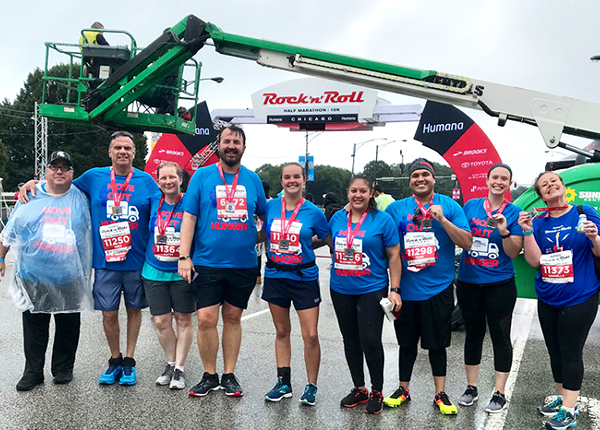
National Van Lines at the Rock ‘n’ Roll Chicago 1/2 Marathon event that was hosted by Move for Hunger. The team raised more than $14.000 in an effort to end hunger.
One way we improve our customer communication is to make a personal connection as soon as possible. The day after an agent registers a shipment with us; we call the customer and confirm everything concerning the dates, locations and the phone numbers. All those little elements seem like they are not that big of a deal, but we train our customer experience team to identify potential issues before they become problems.
We have a general philosophy that if our customer is calling here for some information, the customer is already having a crisis, because we haven’t told them something that they need to know. It might be “When is the driver going to show up to pick up or deliver my stuff?” or “How much do I owe, where do I pay, how do I pay?” And so all of our customer service over the last couple of years has been built around the idea of “how do I get that information to the customer before they have to ask me for it?” and “how do I get it delivered to them in a way that they want it delivered to them?” There are many ways to communicate with customers and we’re striving to identify which method those customers prefer. Just doing that makes them happy and frees up our time to deal with the real issues that we inevitably have in the moving business.
What are some of the most common questions that people ask? What is the hardest part of the move for them?
That is a good question. I do not know if there is one that is the most common, but usually it is related to their pricing and their pickup and delivery dates. A lot of customers do not always understand that they are not the only shipment on that truck. If a customer has a 2000-pound shipment to move from Chicago to California, we have to fill up the truck before we can send it to California. Consumers need to understand why it may take two weeks to get to California. I think that we do a pretty good job explaining it to folks. Anyone who has moved a few times understands, but the guys who are moving for the first time get confused. They are like, “Well, I can drive there in three days. So why can’t you?”
How do you tackle issues with customers?
I want to give a lot of credit to the team here – Jorja Coulter, V. P of Customer Experience & Quality and Mike Yost, V.P. of Operations. They are the folks who run at problems and not away from problems. When we have any kind of an issue, they are all over it and they are calling that customer and trying to develop a solution, rather than make a determination about who is right, or who is wrong. We try to be on top of the problem and address it head-on, because if you try to avoid it, it is only going to get worse.
When you approach it that way, even though a customer may not be ecstatic, 99 times out of 100 they are going to be okay with it. Even though there is always the one customer that goes off the deep end.
And then how do you ensure that your moving crews work the best possible way?
With all of our drivers and crews, we are always getting feedback from our customers. We have points of contact throughout the building who are following up with drivers and agents to make sure that they are complying with our standards of conduct.
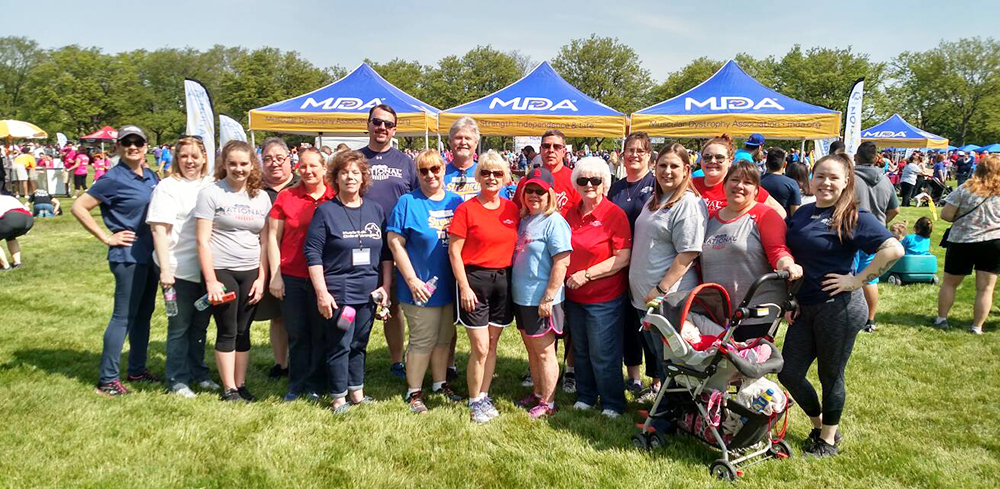
Team NVL walking for Muscular Dystrophy! GO TEAM!
We have a program for our drivers that we call “The Five Star” program. The guys that are meeting the quality expectations make a little more money. That has been a really successful program in order to help ensure that our customers are getting the best service from our drivers.
Furthermore, we offer additional training for our drivers through various online resources from companies we partner with. We want to make sure that they have the latest training on safe driving techniques. We truly value continual education.
And how do you cope with the driver shortage?
It is incredibly challenging, right? We suffer from the driver shortage just like everyone else in our industry. We really try to focus on appreciating our drivers. One of the very simple things we do is to put up a sign. We put “welcome” signs in our entrance lobby when we have visitors. We put up special signs when our drivers come in. It makes them feel special when everyone greets them by name. We had a driver who took a picture of himself with his sign. It is just a nice touch and we do appreciate the guys coming out. In fact, whenever a driver walks into our Operations Department, they get a standing ovation!
Next, we really do have an open door policy. When we bring a new driver in here for orientation, our driver recruiter will bring them by my office and I’ll chit chat with them for a few minutes. We’ll talk about where they are from and all those kinds of little things. And I always tell them the door is open, to come and see me. It legitimately is open unless I am traveling off to some conference. Our schedulers and dispatchers know our drivers by name. They are not just numbers.
When any of our drivers gets pulled over for a DOT inspection, if they get a clean inspection, they’re given a raffle ticket. At the end of the year, we pull random names and somebody wins $250, $500 or $1000. And you can win all three.
We also have referral programs for our drivers and so they are rewarded for helping to bring in new drivers. That also creates a mentor relationship. We just try to use creative ways to let them know how we really care about them, because they are the backbone of our industry. We need their service. And I think that our drivers are second to none in the industry.
What are some of the most interesting jobs you have done so far?
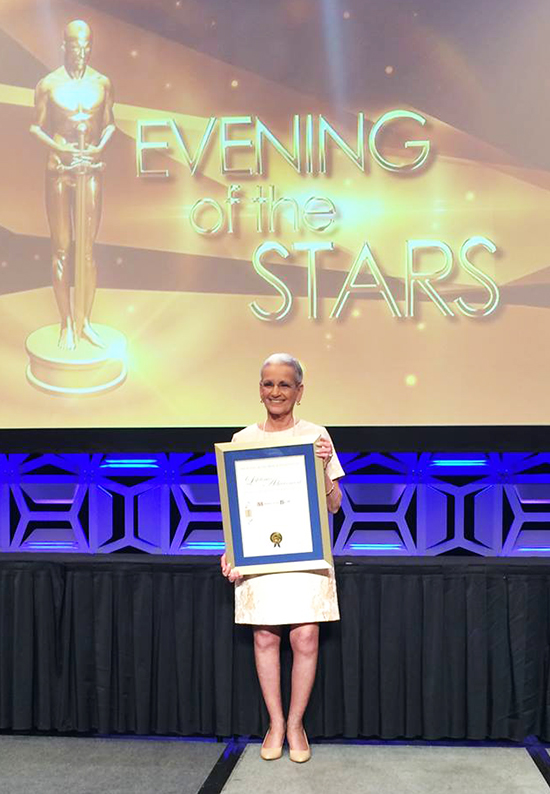
The Moving & Storage Institute (MSI) has honored Maureen Beal, chair and CEO of National Van Lines, with the prestigious MSI Lifetime Achievement Award for Distinguished Service. Beal received the highest honor bestowed by the moving and storage industry during AMSA’s 2016 Conference & Expo in New Orleans.
We moved a firefighters’ memorial from Phoenix, AZ to Boston, MA. It was pretty cool because firefighters do a great job and we are always proud to support anyone in uniform, especially first responders. We have done a few charity moves like that over time that have been very rewarding.
We have also moved families with children who have severe disabilities and needed to be closer to facilities where they can get better care. Those are always good jobs. And it’s always interesting when we get to move a general. We’re proud to say we have moved several generals over the years. They get a lot a lot of attention and interest from the military and it always makes the move challenging.
What is some particular mistake or challenge that you have overcome recently?
There are plenty of mistakes that happen every day. I may have just made a wrong decision, but those things are manageable. I think that the biggest one that I have made and we all continue to make is what I call “the story” that we all have about whatever things are like.
For example, many people believed that the economy had come to a standstill five years ago. Sales people would frequently say, “Well it is really hard out there. The economy is bad.” That is the story that they start believing and that becomes their mindset. As a result, they quit going to the realtor meetings or the Chamber of Commerce meetings. They start to believe that no one is moving; that there are no jobs to be had. Guess what? If you don’t go out there, you’re not going to find any jobs. It becomes a self-fulfilling prophecy and we all do that.
For me I really go back to when I was young. I grew up in a small town and my parents didn’t have two dimes to rub together. We always had plenty to eat. We had a roof over our heads, but I did not have any connections or any prospects for the future. And so I had the story that if there was anything out there I wanted to do, I couldn’t, because I didn’t have the resources. I was like, “I can’t study abroad, because I don’t have that much money. Or, I had to work on spring break. I couldn’t start a business. I couldn’t travel the world. And that was the story I evolved for myself, that these things were impossible. All these things that I couldn’t do. As I have grown up, I realize I was totally wrong. I could have done whatever I wanted to do. I didn’t have anything that would have held me back from doing things, right?
When I went to college, I was not a good student. During my freshman year in college I started thinking, I am free now.” I would stay out too late and not go to class. And by the time I got to be a junior, the lights started go on; I was maturing a little bit. I started going to classes and my grades went up – what a surprise! During my senior year, I was working 30 hours a week at a grocery store and I was taking the maximum class load that they would let you take, which was 18 hours. I got straight A’s and I was working. I was the same student and the classes were harder when I was a senior than when I was a freshman. So what had changed? I had decided that I could do it! I changed my story.
Now let us talk about the industry challenges. We spoke about the driver shortage. What are some of the most concerning regulations?
I think the biggest one for us right now is the ELDs mandate. It’s the issue that is on everyone’s mind, because we are right in the very start of getting all our drivers on board with the ELDs.
Through AMSA and IAM we have asked the government to give us some relief for those times when we are at a customer’s residence and run out of hours. This relief would allow us to get our driver to what we call a “safe harbor,” so that it would not be necessary to park on the street in front of the customer’s house.
As for drivers, while I wouldn’t say they love ELDs, I do think they are okay with them, and they are really getting to know them. However, we have run into some administrative issues and we thought it would take a little less time for us all to adjust.
Another big issue from a regulatory standpoint is competing with brokers. Some brokers arranging moving services ignore some of the regulations that we have to follow, and this makes competing with their pricing difficult.
And the rogue movers are still giving our industry a bad name. We would love to see good enforcement of the existing laws to ensure that the customers out there are getting good service.
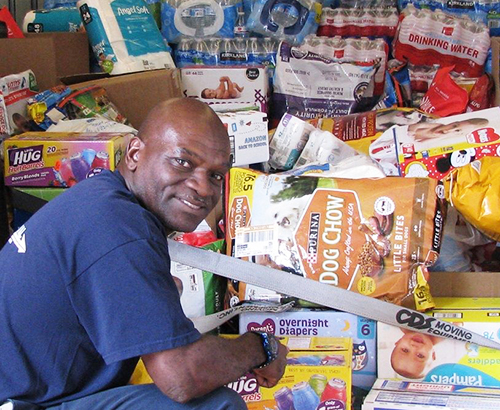
National Van Lines has revved up its Hurricane Florence relief efforts by joining forces with the Village of Broadview’s fire department and putting one of our top-tier drivers on the road hauling a 53-foot trailer full of crucial supplies to affected areas.
Do you think that the way the FMCSA let ELD vendors to self-certify themselves can pose some serious challenges on movers?
I think that is a good lesson that we are facing. It’s similar to the discussion we have with our customers about finding a reputable mover. Right? So, when we did our search for our vendor, we brought in a lot of people to talk with, but we pretty much relied on companies we already knew. And, we ended up working with Rand McNally. They are a well-known company and we had confidence that they would have a product that would meet all the criteria. This is certainly an area where you do not want to take any risks.
And what is some of the technology that you use that makes your business more efficient and be sustainable?
Without the technology that we use, we wouldn’t be able to serve even a tenth of the customers that we serve now. Our service providers all get paid quicker because of technology. Communication is fast and billing can be streamlined. It really speeds up the process immeasurably. We are using technology to develop better ways to dispatch our drivers, and keep them profitable. That also helps us make sure that we are not missing opportunities to fully use their capacity. And so we have developed a few in-house programs.
One product is called “Load Builder” – it helps our schedulers put together the load assignments for our drivers. It uses a visual interface, shipments plotted on a map, instead of just a list of shipments. The mapping allows our schedulers to use both sides of their brains to determine the best routing for some of our drivers. For the customer experience team, we have a program called “Load Tracker.” This tool allows the team to be more flexible and more precise while managing national accounts. They can schedule check calls and various follow-up assignments.
And then, we are working on our own tool that will assist our reps in the field in providing accurate quotes to their prospective customers. It will further help our agents by providing sales data on closing ratios and trending customer needs. As we work on these exciting projects, we have begun to move closer to being a technology company that’s also in the moving business! And that would make us an even better, more independent organization, not relying on too many outside vendors. We would be able to create more personalized solutions for our agents. We definitely like investing in building our own technology. It certainly is worth the time and effort, because in the end we will be able to change and adapt at a much faster pace.
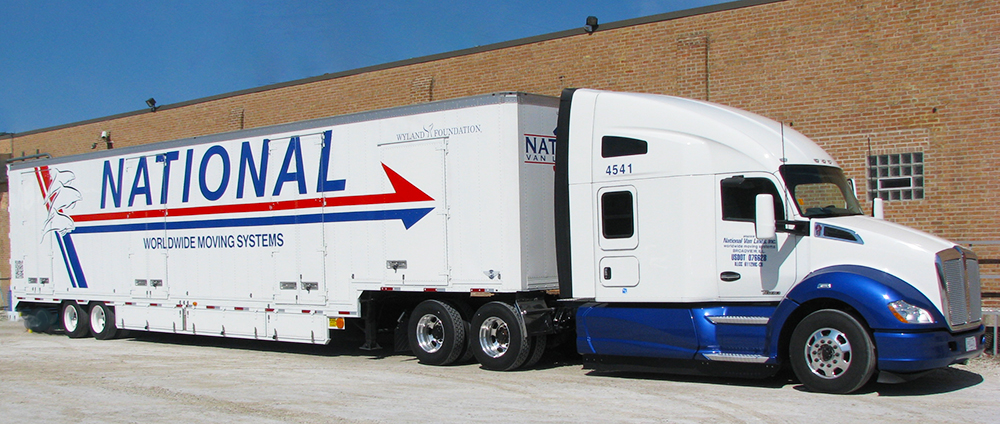
And this is is how fleets look like today. This truck photo from NVL archive is from 2017.
What is the best business advice you have received so far that you want to pass to the next generation of leaders?
I think that the best business advice I have learned so far goes back to what we discussed earlier – have the courage to go beyond the unfortunate stories that you keep telling yourself about how unsuccessful and helpless you are. You have to believe in yourself and work on your dreams.
My next piece of advice would be to accept the fact that you do not know everything. See, the one thing that I know is that I do not know everything. I cannot be the expert on every part of the business and I have to rely on other people to help me understand. Just accepting that you may not be right every time and listening to other viewpoints and collaboration can lead to amazing results.
And what would be your message to people who are about to move?
Do your research on the companies that you are getting estimates from. If you receive an estimate that is too good to be true, it is probably too good to be true. If a company has only positive reviews and not a single bad review, that would also seem too good to be true. Once in a while, we’ve all had someone whose expectations we weren’t able to meet.
And if you can reschedule the move for September, then you should consider the idea. As the industry does not work in full capacity during the non-peak season, consumers will get more attention and may experience a better move. I know that most families want to move when their kids are out of school, but moving during the school year is actually a good idea. At school, those kids will be surrounded by other kids of the same age and interests, and making friends becomes easier.